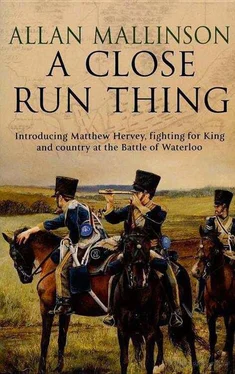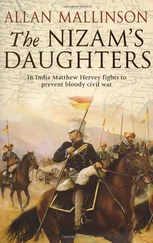Allan Mallinson - A Close Run Thing
Здесь есть возможность читать онлайн «Allan Mallinson - A Close Run Thing» весь текст электронной книги совершенно бесплатно (целиком полную версию без сокращений). В некоторых случаях можно слушать аудио, скачать через торрент в формате fb2 и присутствует краткое содержание. Год выпуска: 1998, ISBN: 1998, Издательство: BANTAM PRESS, Жанр: Исторические приключения, на английском языке. Описание произведения, (предисловие) а так же отзывы посетителей доступны на портале библиотеки ЛибКат.
- Название:A Close Run Thing
- Автор:
- Издательство:BANTAM PRESS
- Жанр:
- Год:1998
- ISBN:9780553507133
- Рейтинг книги:3 / 5. Голосов: 1
-
Избранное:Добавить в избранное
- Отзывы:
-
Ваша оценка:
- 60
- 1
- 2
- 3
- 4
- 5
A Close Run Thing: краткое содержание, описание и аннотация
Предлагаем к чтению аннотацию, описание, краткое содержание или предисловие (зависит от того, что написал сам автор книги «A Close Run Thing»). Если вы не нашли необходимую информацию о книге — напишите в комментариях, мы постараемся отыскать её.
A Close Run Thing — читать онлайн бесплатно полную книгу (весь текст) целиком
Ниже представлен текст книги, разбитый по страницам. Система сохранения места последней прочитанной страницы, позволяет с удобством читать онлайн бесплатно книгу «A Close Run Thing», без необходимости каждый раз заново искать на чём Вы остановились. Поставьте закладку, и сможете в любой момент перейти на страницу, на которой закончили чтение.
Интервал:
Закладка:
‘It has certainly made him cautious,’ Lankester agreed, with a greater disposition towards discretion.
‘Uxbridge at least would have been able to advocate a little more equanimity,’ continued Edmonds. And then, casting aside all reserve, he opined that if the Earl of Uxbridge had remained the cavalry commander for this second expedition to the Peninsula, instead of Sir Stapleton Cotton, Wellington might by now have been prevailed upon to have Slade dismissed. He could but wonder, he declared with a sigh, at the complicated web of patronage that made Wellington drive his army so hard and yet at the same time ignore such monstrous inaptitude.
But he knew at least that it was a web, a web as unfathomable as that which was the Fates’. The strands might be barely discernible but they could hold a man like him fast; and, for all the twenty-five years which separated them, he and now Hervey were caught like worthless carrion while others who knew its secrets were able to traverse the delicate threads and go wherever they pleased. He had accepted it with remarkable forbearance during most of his service, but he had of late become of the mind that when skilfulness amounted to a disadvantage because of a superior’s resentment, then the web was no longer merely recondite — it was corrupt. Why it had taken him so long to reach this conclusion, when he pondered on it, puzzled him, for a full five years earlier he had had a taste of Slade’s ineptness. There, at Sahagun, he had deftly manoeuvred his own squadron while Black Jack, in action for the first time, had fiddle-faddled at the head of his brigade and almost let the French slip — and all this in front of Uxbridge too (who had never troubled to conceal his poor opinion of his subordinate). Edmonds’s mere proximity ever afterwards could excite Slade’s resentment, and that his subsequent advance to major had been by field promotion rather than by purchase (a manner of advancement that Slade had more than once in his hearing derided as fit only for officers from the ranks) had done nothing to assuage the general’s envy and detestation. Jealousy and snobbery, patronage and intrigue — the web.
‘By heaven,’ Edmonds sighed, ‘the French are nothing to fear compared with that blackguard.’
‘It has always occurred to me as singular that adultery should be grounds for dismissal during times of war.’
Lankester’s proposition did not immediately reveal its sense to Edmonds, who was all but lost in contemplation of his brigade commander. ‘What? Slade — adultery?’
‘No, Uxbridge!’
Edmonds shook his head with disbelief at his own slowness. ‘Well, perhaps it was hardly the breaking of the seventh commandment but the manner.’
‘Another commandment, you mean,’ smiled Lankester. ‘Thou shalt not elope with the Marquess of Wellington’s sister-in-law?’
Edmonds could not but reflect the smile, the first he had been tempted to that day. ‘Well, certainly not in a post-chaise from under the very nose of his younger brother!’
Lankester thought he perceived the storm cones to be lowering. ‘It occurs to me that, if Nelson had been deprived of his command because of Lady Hamilton, the French fleet might still be at sea instead of under it at Cape Trafalgar — and we might yet be patrolling the Sussex coast.’
Edmonds nodded and frowned: Lankester had judged the storm’s passing over-hastily. The major’s bile rose again at this reference to the Royal Navy, whose utilitarian principles he had long held in admiration. ‘I do not see why we must be foisted with knaves and imbeciles when the Admiralty are perfectly able to order their affairs in so eminently business-like a fashion,’ he snorted.
‘Or does the Navy have its patronage, too,’ countered Lankester, ‘less manifestly connected with birth perhaps, but patronage none the less?’
‘All I know is that if Nelson had been an officer under Slade’s command he would not have risen beyond a troop!’ rasped Edmonds, deciding that it was time he took up his position in front of the regiment, and pressing his charger forward with sudden urgency.
Major Joseph Edmonds, his left eye almost closed by the pain in his jaw, peered into the distance as the infantry pressed their assault across the Languedoc Canal towards the outer defences of Toulouse, the first city they had reached since coming down from their winter quarters in the Pyrenees. He might rant against the likes of Slade, but the object of his profoundest disapproval — the conduct of the campaign itself — he kept privy. With a concealed passion he utterly disputed the need to fight Soult here, especially since rumours had been circulating for days that Bonaparte was finished, dead even. The French had been deserting in droves: many had given themselves up to the Sixth’s own patrols. And, so far as he was able to make out, Bonaparte’s more general situation was no more felicitous. In the east the Continental allies — Austria, Prussia, Russia and Sweden — were making ever better progress towards Paris. A month ago Wellington had occupied Bordeaux, but to what end? Surely now there was no more need than to invest, with the merest token force, any garrison which stood in their path. Paris was the cornerstone of Bonaparte’s edifice; there was little purpose, therefore, in trifling with outworks. Edmonds began to wonder whether anyone had any notion of strategy other than fighting the enemy wherever and whenever he stood, as if every last French musketeer must be slaughtered, or put into a prison hulk, before victory might be claimed. Was there no campaigning art? Were they to continue breaking windows with guineas? Edmonds knew his history and despaired that the commander-in-chief seemed not to share his perception of the wars of antiquity, of Caesar and Hannibal. Why was Wellington so Fabian a general? Quintus Fabius Maximus — Cunctator (‘the Delayer’) — reviled in life for his caution and then lauded for it in his later years: Rome would never have been defeated at Cannae with such a general, the Senate had mourned. But why so many officers, Wellington included, took Fabius Maximus as their paradigm rather than Hannibal was quite beyond him. No wound in the dozen or more during his service had cut him so deeply as the rebuff he had received two winters before when he had submitted a stratagem worthy, he felt sure, of the grace of Baal himself, to manoeuvre the French out of Spain. It had been returned with a peremptory note that the commander-in-chief did not wish to distract his field officers from their first duty of attending to their commands. Afterwards he had brooded, and contemplated selling out, but in the end he had turned once more to his trusty volume of Seneca and, taking deep draughts from the treatise on ‘The Steadfastness of Wise Men’, he had redoubled his stoic efforts in the place that Fortune had appointed him.
If the final victory were, by rumour and his own reckoning, so close, however, then he knew these low spirits made little sense. Was it that he considered himself to blame for Hervey’s arrest? He had given him command of a flank picket, and it was by rights a lieutenant’s command; but, then, Hervey had seen more service than many of the lieutenants. Why in any case repine over the fate of an insignificant cornet when a sou’s worth of powder and shot might carry off his young head at an instant? The adjutant had cautioned him more than once that, if he were to take responsibility so personally for every last man in the Sixth, dyspepsy would soon overcome him. But the warning had had no effect.
He wondered what Lord George Irvine would do if he were here. He had not the inkling of an idea, however, for Lord George understood the complexities, and possibilities, of the web in a way he never could. But, be whatever that may, he knew well enough that, behind him, the Sixth were restive, for they had been posted thus for four hours without a move. Pain shot through his jaw again, catching him off guard. ‘Christ!’ he exploded. ‘Dismount!’
Читать дальшеИнтервал:
Закладка:
Похожие книги на «A Close Run Thing»
Представляем Вашему вниманию похожие книги на «A Close Run Thing» списком для выбора. Мы отобрали схожую по названию и смыслу литературу в надежде предоставить читателям больше вариантов отыскать новые, интересные, ещё непрочитанные произведения.
Обсуждение, отзывы о книге «A Close Run Thing» и просто собственные мнения читателей. Оставьте ваши комментарии, напишите, что Вы думаете о произведении, его смысле или главных героях. Укажите что конкретно понравилось, а что нет, и почему Вы так считаете.









